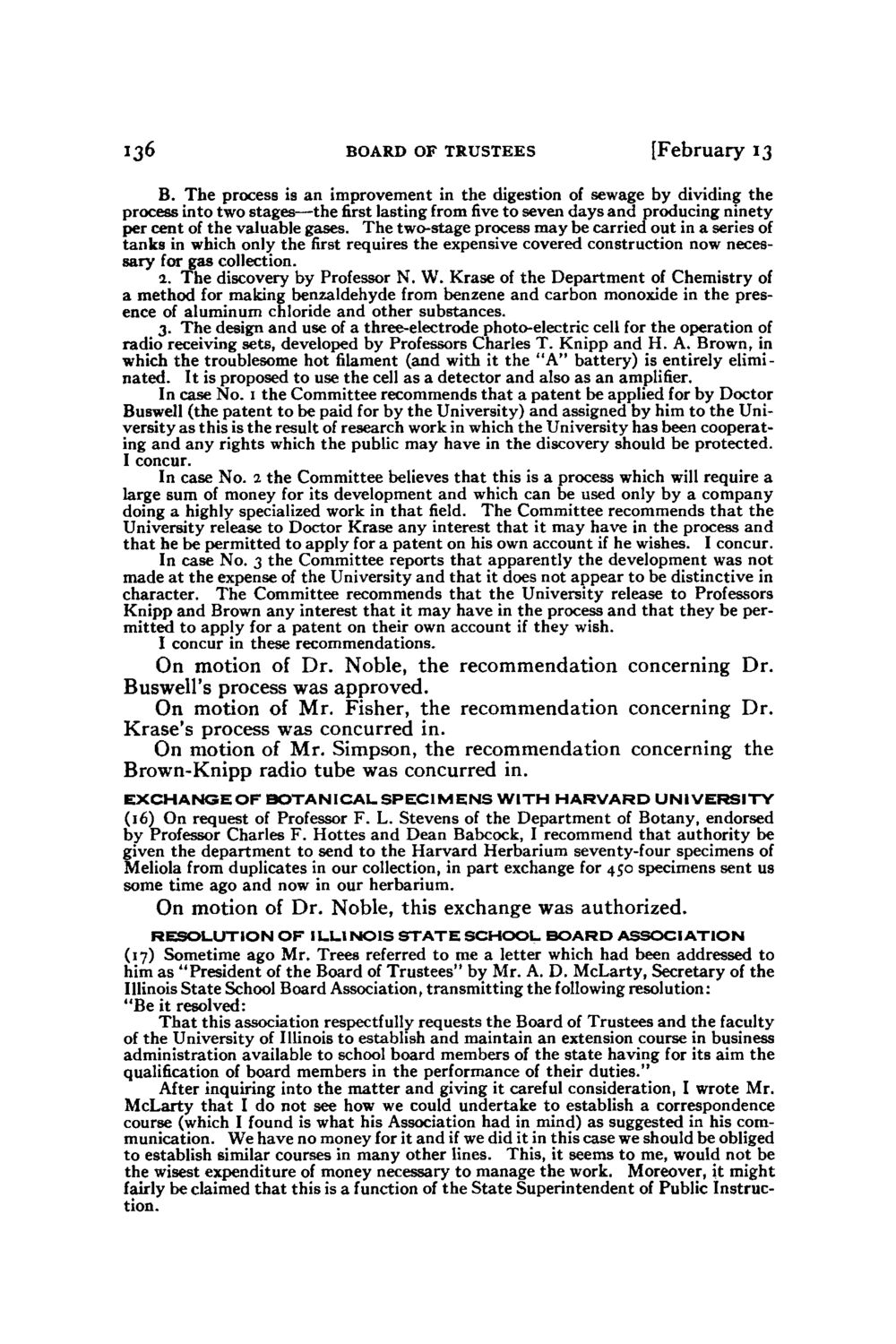| |
| |
Caption: Board of Trustees Minutes - 1930
This is a reduced-resolution page image for fast online browsing.

EXTRACTED TEXT FROM PAGE:
136 b o a r d of trustees [February 13 B. The process is an improvement in the digestion of sewage by dividing the process into two stages—thefirstlasting from five to seven days and producing ninety per cent of the valuable gases. The two-stage process may be carried out in a series of tanks in which only the f r t requires the expensive covered construction now necesis sary for gas collection. 2. The discovery by Professor N. W . Krase of the Department of Chemistry of a method for making benzaldehyde from benzene and carbon monoxide in the presence of aluminum chloride and other substances. 3. The design and use of a three-electrode photo-electric cell for the operation of radio receiving sets, developed by Professors Charles T. Knipp and H. A. Brown, in which the troublesome hotfilament(and with it the "A" battery) is entirely eliminated. It is proposed to use the cell as a detector and also as an amplifier. In case No. 1 the Committee recommends that a patent be applied for by Doctor Buswell (the patent to be paid for by the University) and assigned by him to the University as this is the result of research work in which the University has been cooperating and any rights which the public may have in the discovery should be protected. I concur. In case No. a the Committee believes that this is a process which will require a large sum of money for its development and which can be used only by a company doing a highly specialized work in that field. The Committee recommends that the University release to Doctor Krase any interest that it may have in the process and that he be permitted to apply for a patent on his own account i he wishes. I concur. f In case No. 3 the Committee reports that apparently the development was not made at the expense of the University and that it does not appear to be distinctive in character. The Committee recommends that the University release to Professors Knipp and Brown any interest that it may have in the process and that they be permitted to apply for a patent on their own account i they wish. f I concur in these recommendations. O n motion of D r . Noble, the recommendation concerning D r . Buswell's process w a s approved. O n motion of M r . Fisher, the recommendation concerning D r . Krase's process w a s concurred in. O n motion of M r . Simpson, the recommendation concerning the B r o w n - K n i p p radio tube w a s concurred in. EXCHANGE OF BOTANICAL SPECIMENS WITH HARVARD UNIVERSITY (16) O n request of Professor F. L. Stevens of the Department of Botany, endorsed by Professor Charles F. Hottes and Dean Babcock, I recommend that authority be given the department to send to the Harvard Herbarium seventy-four specimens of Meliola from duplicates in our collection, in part exchange for 450 specimens sent us some time ago and now in our herbarium. O n motion of D r . Noble, this exchange w a s authorized. RESOLUTION OF ILLINOIS STATE SCHOOL BOARD ASSOCIATION (17) Sometime ago Mr. Trees referred to me a letter which had been addressed to him as "President of the Board of Trustees" by Mr. A. D. McLarty, Secretary of the Illinois State School Board Association, transmitting the following resolution: "Be it resolved: That this association respectfully requests the Board of Trustees and the faculty of the University of Illinois to establish and maintain an extension course in business administration available to school board members of the state having for its aim the qualification of board members in the performance of their duties." After inquiring into the matter and giving it careful consideration, I wrote Mr. McLarty that I do not see how we could undertake to establish a correspondence course (which I found is what his Association had in mind) as suggested in his communication. W e have no money for it and i we did it in this case we should be obliged f to establish similar courses in many other lines. This, it seems to me, would not be fairly be claimed that this is a function of to manageSuperintendent of Public Instruction. the wisest expenditure of money necessary the State the work. Moreover, it might
| |